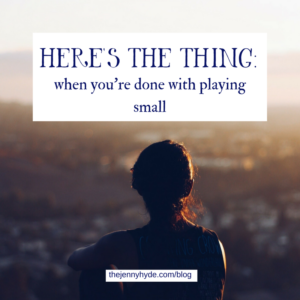We all have moments, days (weeks?) when we struggle to show up for our goals and vision.
Sometimes we have to trick our imposter syndrome or our inner critic so they don’t notice us side-stepping them and playing bigger.
Sometimes we have to gently encourage ourselves to form new habits or do the things we need to do, but don’t particularly want to do.
Sometimes we need some practical inspiration and suggestions for things that will actually move us forward in the direction we want to go.
That’s what I’m sharing today: my list of things you can spend 15 minutes on that really benefit your mood, and therefore your business (and sometimes the other way around!).
You can read on for my tips, but I also really encourage you to write your own list.
Use the timer on your phone and stop when the alarm goes off.
- Tidy up. Whether it’s your desk, your workspace, your entranceway, your bag, just set a timer and go. (I hate tidying up but it ALWAYS makes me feel better.)
- Write down your strengths. Go for the whole 15 minutes, and keep your hand moving. You’ll feel better for it at the end. (And it might even spark some big business ideas.)
- Write down all your worries. As above, but maybe burn it or do something about it at the end. Either way, get it out of your head and remove your blocks.
- Go for a walk. Even if it’s just up and down your own garden or around the block a couple of times. 15 minutes. In nature. Go.
- Find out your bestsellers. Not what you think are your bestsellers. Check the numbers: highest units sold, but also which item made you the most money? Knowledge is power.
- Look at your website traffic. Where are people finding you? If you don’t know how to track your traffic, spend 15 minutes finding out.
- Put your prices up. Or at least start to run the numbers. Around 70% of my clients have needed to put their prices up by 20% to actually make a profit or take a salary for themselves. Chances are you need to do the same.
- Write a newsletter. If you have an email list and haven’t sent an email for a month or more, JUST EMAIL THE PEOPLE. You don’t need a 10-part email strategy, just send some nice photos and words.
- Brainstorm or research a new project or product.
- Do your bookkeeping. Little and often is the way forward! If you don’t have bookkeeping software, research it. It’ll make your life easier next time.
- Look at your website’s homepage. Tweak, update, edit, or write a bigger plan to do so.
- Look at your long-term business goals. Or write down three things you’d like to achieve in the next 12 months. Get inspired by them!
- Meditate. Find a guided meditation on an app (I like Insight Timer), or put on some relaxing music and breathe for 15 minutes. You won’t regret it.
- Write a pitch. Maybe you want to appear on a podcast or you’d like to write a guest blog or appear in a magazine. Start writing to the relevant people. (Tip: I love Tiffany Han’s 100 Rejection Letters project for this.)
- Analyse your to-do list. What’s bringing in money? What’s fun? What’s future-focused? What’s a quick win? Now cross out anything that doesn’t move your business forward, that’s a nice idea but getting in the way of your focus. (We do this every month in Progress not Perfection. It’s a learned skill.)
If you need a more personal or a deeper to-do list, if you want to shift those worries and blocks, you might like to consider business mentoring and coaching with me. I have two spots open right now, and you can get in touch to set up a free consultation to find out if we’re a good fit.
Or for more free resources, check out my 20 favourite business coaching questions and go deeper!



